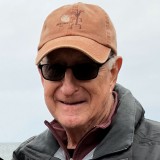Reliving History
The J.M. Davis Arms and Historical Museum recreates the historic Mason Hotel’s lobby and coffee shop.
By: Duane Blankenship | Category: In Our Communities | Issue: June 2007
Jason Schubert, curator for the J.M. Davis Museum in Claremore, stands beside J.M. Davis’ roll top desk and holds an original coffee shop menu at the Mason Hotel.
A replication project of the historic Mason Hotel is now underway at the J.M. Davis Arms and Historical Museum in Claremore, recreating the hotel’s lobby and coffee shop. The exhibit will be at the entrance to the museum, greeting visitors and introducing them to J.M. Davis. Davis, who acquired his first gun from his father at age seven, built his hobby into the largest firearms collection in the world.
The new exhibit will feature the Mason Hotel’s original front desk and counter, gun displays that hung on the walls in the hotel lobby, room key boxes, the hotel’s cash register and some of the original lobby furniture, including a ceiling fan and more. A replica of the hotel’s elevator doors is being constructed and will also be a feature of the exhibit.
A project is underway to fund the installation of a touch screen, which will allow the hotel lobby exhibit to be the museum’s first interactive display. Once installed, it will give visitors four to five minutes of history on the life of J.M. Davis, as well as Claremore’s historic Mason Hotel that was demolished in 1986. The one-room exhibit will be nostalgic for many who remember visiting the Mason when they were younger.
J.M. Davis bought the Mason Hotel in 1916 and immediately began displaying his gun collection in the hotel’s lobby. As the collection expanded, so did the space for gun displays. The lobby, coffee shop, hallways and a few upstairs rooms were covered with Mr. Davis’ fascinating collection. According to John Cummings, the museum’s executive director, “People who knew Mr. Davis say that he was almost always at the front desk in the lobby and loved to trade and talk about his prized collection.”
The original Mason Hotel
Mr. Davis owned the Mason Hotel until he died in 1973 at the age of 85. His collection was moved to the J.M. Davis Museum in 1969. During his life, Mr. Davis’ reputation as a collector grew tremendously as travelers visited from all over the world to sell or trade relics with him. Many sought him out just to get his opinion on certain items. In his later years, many people gave him valuable guns for posterity. They knew their collectibles would be taken care of in a safe place and would be shared with others in the years to come. “Mr. Davis would trade for just about anything that was unique,” says Cummings.
The J.M. Davis Museum is much more than a gun collection. The museum has 50,000 artifacts in its collection, 13,400 of which are guns. The collection also includes music box exhibits, World War I posters, political buttons and much more.
Cummings says he has been trying to locate the original wooden Indian that stood at the front of the Mason Hotel, as well as the original neon sign that hung above the front entrance. If anyone knows the whereabouts of these two items or any items that were sold at an auction prior to the Mason Hotel’s destruction, please give the J.M. Davis Museum a call. They would love to borrow additional items to display in the new Mason Hotel lobby exhibit.
The replication of the Mason Hotel lobby and the guns that adorned its walls will be the foundation of the J.M. Davis Museum. Visit the J.M. Davis Museum and experience the remarkable effort made by Mr. Davis to preserve a piece of our history to share with future generations.
For more information, contact
J.M. Davis Arms and Historical Museum
333 N. Lynn Riggs, Claremore, OK 74017(918) 341-5707

About Author Duane Blankenship
Blankenship graduated from the University of Oklahoma and has enjoyed a lifetime career in advertising. He started his own advertising business in 1993 and enjoys creating graphic art and writing. Hobbies include hunting, fishing and pencil drawings. Duane and his wife, Janice, have been married over 50 years and are active in their church and community. He has been a contributing writer for Value News/Values Magazine since 2005.
J.M. Davis Arms & Historical Museum
For more information, contact:
J.M. Davis Arms & Historical Museum
More about J.M. Davis Arms & Historical Museum:
More ArticlesSubscribe
For Free!
